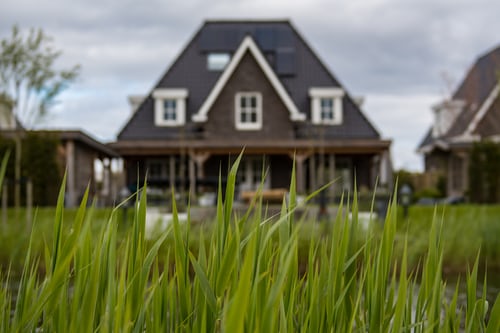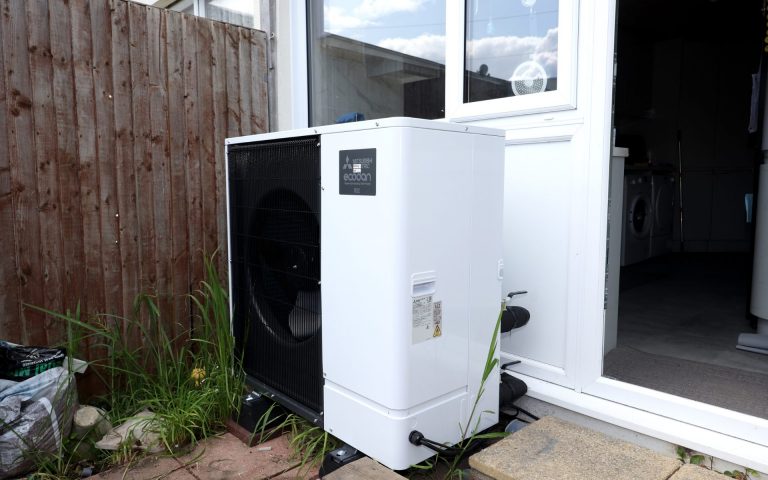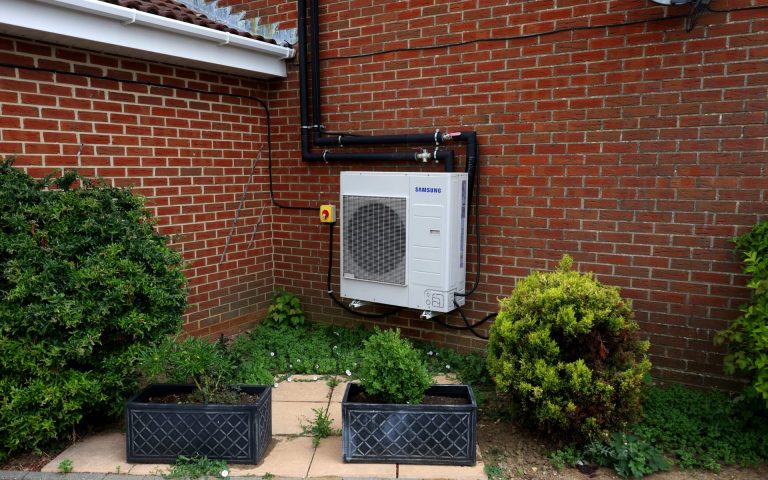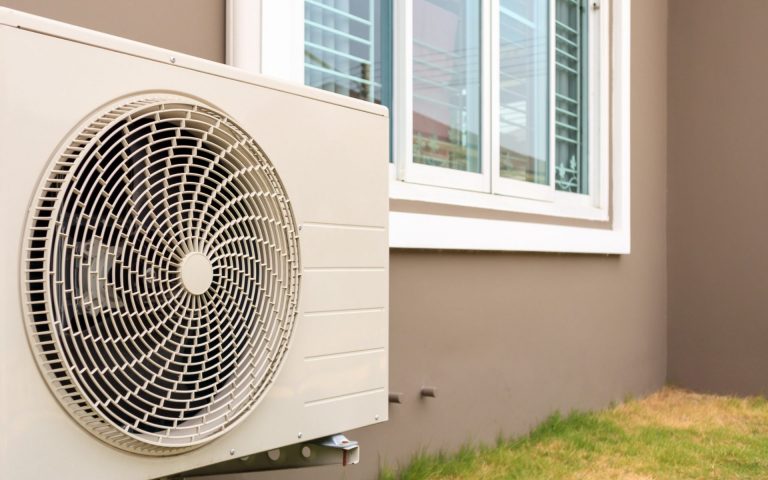What with COP26 taking place, the spotlight is firmly on sources of renewable energy and how we can collectively tackle the global issue of climate change. With this in mind, it’s no wonder that people are starting to think about alternative ways to heat their homes and water, that don’t rely on gas or other fuels that produce carbon emissions.
Last week we talked about Air Source Heat Pumps, looking at the advantages and disadvantages of using this renewable technology to heat our homes.
This week we’re going to look at another type of Heat Pump – The Ground Source Heat Pump. Let’s see how this works and whether it could be an option for your home.
What is a Ground Source Heat Pump?
Just like an Air Source Heat Pump takes heat from the air, a Ground Source Heat Pump takes heat from the ground. Pretty much what it says on the tin!
But how does that heat in the ground help to heat your home and water?
You might be wondering how much heat the ground holds – Especially now we’re going into Winter and have had nearly a week of cold, frosty mornings. Thankfully, even during the colder weather, the ground will continue to absorb solar energy, with underground temperatures sitting between 10 and 15 degrees Celsius all year round.
This heat is extracted using a ground loop pipe which is buried underground. These pipes can be installed either in a vertical borehole or a horizontal trench. With a vertical borehole, the pipes sink to further depths, whereas those in a horizontal borehole spread out wider.
The longer the ground loop pipe, the more heat can be extracted. Therefore, the more outdoor space you have available, the more effective your heat pump would be.
The underground heat is absorbed by a mixture of water and anti-freeze that is circulated through the pipe. It is then taken round to the Heat Pump where it is further heated before entering the heat distribution system in your home to provide hot water and heat to radiators.
So that’s how it works in simple terms, let’s have a look at the advantages and disadvantages of a Ground Source Heat Pump.
What are the Advantages of a Ground Source Heat Pump?
As with everything technological, including renewable energy sources, there are pros and cons which make it more or less suitable for certain homes. There are many advantages of a Ground Source Heat Pump that could make it a good choice for your property.
- Ground Source Heat Pumps are kind to the environment
The great thing about Ground Source Heat Pumps, is that they can heat a home without emitting carbon into the atmosphere – Unlike Gas and Oil boilers. This is of course one of the main benefits of using a Heat Pump to heat your home. Carbon is a leading cause of climate change, and much of the UK’s carbon footprint comes from how we heat our homes. Replacing a gas or oil boiler with a Ground Source Heat Pump would be a more environmentally friendly option.
- Ground Source Heat Pumps are highly efficient
Whilst it is dependent on the model of Heat Pump you choose and the time of year, Ground Source Heat Pumps can deliver 3-5 times as much energy as they use – Making them highly efficient. In order to operate, they use electricity, which although is one of the most expensive sources of energy, is used highly efficiently by this heating system.
- Ground Source Heat Pumps could help to reduce heating bills
If you have a gas boiler to heat your home and water, you will be reliant on your energy supplier delivering natural gas to your house whenever the heating is turned on, which of course your pay for. With recent events where energy suppliers have gone bust, and tariffs have increased, more home owners may be interested in reducing this reliance on their gas energy supplier. A big plus when it comes to Ground Source Heat Pumps is that you will be able to reduce this reliance and hopefully see a decrease in your heating bill costs. If you currently use an LPG boiler or electricity for your heating system, then you’re most likely to see cost saving benefits on your bills.
- Installing a Ground Source Heat Pump could entitle homeowners to RHI payments
You may or may not be familiar with the government’s Renewable Heat Incentive (RHI). This scheme enables eligible homeowners with Ground Source Heat Pumps to claim quarterly payments over 7 years in exchange for the renewable heat being generated.
- Ground Source Heat Pumps are a sustainable energy source
When it comes to heating our homes, gas and oil boilers are what we as a population know. It’s familiar and we know how it works. No one likes change! But unfortunately, we cannot go on heating our homes with fossil fuels forever. It’s not sustainable, and it’s not good for the environment. The great thing about Ground Source Heat Pumps is that they will never run out – There will always be heat in the ground for us to harness in order to heat our homes. A renewable, more sustainable source of energy is the future of home heating and now is a great time to start thinking about the alternatives to our trusty gas boilers. It doesn’t have to be an imminent replacement – The boiler police aren’t going to come knocking! But it is something to start to consider and understand more about in preparation.
- Ground Source Heat Pumps are safe
Because Ground Source Heat Pumps extract heat from underground, they aren’t a combustion-based heating system. This makes them safer than the conventional boiler. Of course, boilers are safe – All modern boilers need to meet strict safety standards. If you have a carbon monoxide detector and carry out any maintenance and regular boiler services by Gas Safe Registered heating engineers, then you are taking the necessary steps to keep your boiler and home safe. The difference with a Ground Source Heat Pump is that it doesn’t pose a carbon monoxide leak risk at all. It also has less moving parts, which means that a breakdown is less likely.
- Ground Source Heat Pumps are very quiet
Modern boilers are mostly very quiet, but will make a bit of noise when in operation. Once in a while you may find you have banging, clanging pipes which imply a fault with the heating system and can be very noisy. In comparison to boilers and even Air Source Heat Pumps, Ground Source Heat Pumps are very quiet and make very little noise even when in operation.
- Ground Source Heat Pumps don’t need to be replaced for 20-25 years
Ground Source Heat Pumps last approximately twice as long as gas boilers. They usually need to be replaced every 20 to 25 years. And that’s just the pump! The pipes themselves that are underground can last for up to 70 years without needing to be replaced.
What are the Disadvantages with Ground Source Heat Pump?
Well, what’s not to like? Reading through the pros of Ground Source Heat Pumps, it seems a pretty straightforward switch – Why isn’t every home installing one now? Whilst it’s true that for many homes a Ground Source Heat Pump could be a great choice for a heating system, there are also some disadvantages to consider before throwing your gas boiler out in the cold. Remember also that Ground Source Heat Pumps aren’t the only sustainable alternative to gas boilers.
- Installation of Ground Source Heat Pumps isn’t always practical
In order to install a Ground Source Heat Pump, you need a reasonably sized outdoor area where the pipes can be buried. If this isn’t possible, then this Heat Pump isn’t going to be an option.
- The installation of a Ground Source Heat Pump is disruptive
It’s not hard to imagine the disruption of having to install pipes underground. You will need to enable access to digging machinery, and your garden will have to be dug up in order to lay the pipes.
- Insulation is essential for a Ground Source Heat Pump to be effective
If you want to feel the full benefits of a Ground Source Heat pump, you will need to make sure that your home is fully insulated. Without this, the Heat Pump won’t work very efficiently or effectively. This means that if your home doesn’t already have them, you will need to get cavity wall insulation, roof insulation and double glazing before thinking about installing a Ground Source Heat Pump.
- Ground Source Heat Pumps are best suited to larger heat distribution systems
Heat pumps produce hot water to a lower temperature than conventional boilers. This means they’re best suited for installation alongside large radiators or underfloor heating. If the radiators in your home are currently small then this will add to the installation costs.
- Ground Source Heat Pumps can lead to increased electricity bills
As we mentioned above, Heat Pumps use electricity to heat your home, which means that your electricity bills will more than likely rise. The key is to work out whether the decrease in your gas bill will balance out with the increased electricity usage.
- Ground Source Heat Pumps cost a lot upfront to install
One of the biggest disadvantages of Heat Pumps are the big expense of having them installed. No heating system is particularly cheap to install, but Heat Pumps are significantly more expensive than boilers. To install a Ground Source Heat Pump, you’re probably looking at a cost of around £20K. This does of course vary depending on the model and how complex it is to lay the pipes at your property.
- You may need planning permission to install a Ground Source Heat Pump
Not all cases of Ground Source Heat Pump installation will need planning permission, but if you live in a listed building or a conservation area then you may well need it. It’s always a good idea to check with your local council before carrying out any work.
What’s the Verdict?
The aim of this article isn’t to make you rush out and install a more sustainable, environmentally friendly alternative to your gas boiler.
However, with climate change and activism in the forefront of everyone’s mind, especially during COP26, it makes sense to start exploring alternatives to consider in the future. If you still have a modern condensing boiler in good working order, then don’t be in a hurry to replace it.
When the time does come and you find yourselves needing to replace your boiler, then hopefully you will find that you are well equipped with information to know what sustainable alternatives would work well for your home.
Our Expert Opinion
Our CEO Gary has over 15 years experience in the industry, with knowledge and professional advice
you can rely on.
Gary says;
“My professional opinion is that the current technology doesn’t suit our housing stock.
I believe a hybrid approach is best for most of our customers. The heat pump would cover the vast majority of the heating demand, with the existing Combi Boiler delivering the hot water as it currently does.”
This provides a great compromise – Of ensuring that your heating needs are met, that costs are not
too high, and you are taking steps to help the environment through using renewable energy.
Clean Heating with Aura Heating
Here at Aura Heating, we are ready to provide homes across the South Coast with clean heating.
If you are interested in using a heat pump to heat your property, we are here ready to install it.
As we mentioned above, there are grants available to help with the costs – Our friendly customer service team are happy to talk this through with you and let you know the options.
We can also arrange for an engineer to come and look at your property to see whether a heat pump would work for you and your home.






